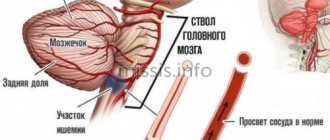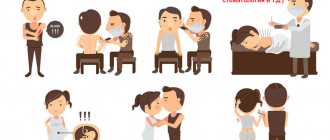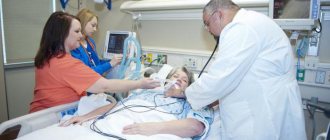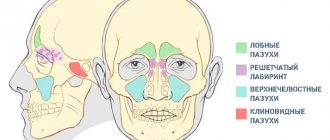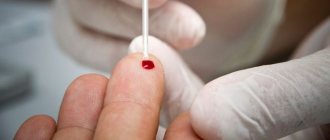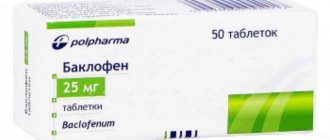Anonymously
Around the clock
Article verified by an expert
Kolosunin Nikolay Vladimirovich
Psychotherapist, narcologist. Work experience - 20 years
Read in the article:
- Overdose in drug addiction
- Common causes of overdose
- Overdose symptoms
- Consequences of overdose for humans
- First aid for overdose
- Treatment of drug addiction in a hospital
People who use drugs flirt with death. The most common cause of death among drug addicts is overdose. Drug addicts believe that they are perfectly capable of correctly calculating the dosage of a prohibited substance. This self-confidence becomes the cause of overdose even among drug addicts with many years of experience. And if earlier it was believed that the risk of overdose was higher among heroin addicts, now with the spread of synthetic drugs, everyone who uses illegal substances is at risk.
What is a drug overdose or overdose?
The phenomenon of overdose occurs due to the fact that the body cannot accept certain substances. If too large a portion of the drug is ingested in a short period of time, dangerous effects, even death, are likely, so it is better not to bring the problem to such a point, but at the first sign of danger, discuss the possibilities of drug rehabilitation in an Israeli clinic.
The body reacts differently to different types of substances. Heroin with other opiates and sedatives (alcohol, benzodiazepines) make the body work more slowly. This often leads to difficulty breathing, and when it stops completely, the heart also stops.
Exceeding the content of narcotic substances, even on a small scale, can inhibit the conduction of impulses in the brain. The return signal that a sigh is needed or an increase in rhythm does not reach the pulmonary parenchyma or one of the parts of the heart, as a result they simply stop functioning.
Sometimes, after leaving the dispensary where he received treatment, a person takes the previously usual dose of the drug and dies due to an overdose, since the body has been cleansed and its sensitivity to chemicals has increased.
If a person regularly uses amphetamines, he will soon develop addiction and dependence. The age-old question is: what dose of amphetamine causes an overdose? In order to obtain the desired effect, more and more of these substances are needed. As a result, the dosage of the drug used may be several times higher than the original amount. Many people who use amphetamines in large quantities for several days or weeks experience disorientation and psychosis, since these substances can provoke attacks of anxiety, paranoia, and distort the sense of reality. Acute lethal doses of amphetamine for adults are recorded at 20-25 mg/kg, in children - 5 mg/kg, but in adults, death was observed at 1.5 mg/kg.
Artificial respiration technique
The algorithm of actions when performing artificial ventilation is as follows:
- After making sure that there are no foreign bodies (including vomit) in the upper respiratory tract, tilt the drug addict’s head back and, pressing on the corners of the lower jaw with both hands, open the mouth, pushing it forward and upward.
- If necessary, the drug addict's mouth is covered with thin gauze (to avoid infection with certain diseases).
- Next, you must close the addict’s nose and “inhale”, wrapping your lips around the victim’s lips. To do this, take as deep a breath as possible and immediately (instantly) exhale the air from your lungs to the victim. It is important to “inhale” immediately after taking air into the lungs, so that the oxygen does not have time to metabolize into carbon dioxide and enters the drug addict unchanged!
- About 18–20 “breaths” are taken within a minute. The absence of a pulse is an indication for closed cardiac massage.
Symptoms of overdose on different types of drugs
Find out what drug addicts suffer from and how an overdose occurs when there is an excess of various harmful substances in the body.
Signs of dangerous intoxication are:
- copious discharge of foam from the mouth;
- the appearance of convulsions of the upper and lower extremities;
- panic attacks, fear of death;
- loss of consciousness;
- cessation of breathing.
The initial symptom of a drug overdose is pain in the head - even strong antispasmodics cannot eliminate it. Such painful sensations increase with bright light and the slightest extraneous sounds.
Such symptoms occur when the drug is administered intravenously or intramuscularly. If there is no person nearby who can help, the addict may die within a few minutes. In any case, after resolving the overdose issue, it is necessary to begin effective drug addiction treatment.
Salt overdose
Due to an overdose of salts, a person may well die. Significant dosages cause a rise in body temperature to 41 or even 42 degrees, which provokes the appearance of edema in the brain and the death of a person. As you can see, rehabilitation in a drug treatment center in Israel is necessary even before the problem develops to such a large scale.
Amphetamine overdose
Among the main manifestations of an amphetamine overdose are:
- changes in mental status, disorientation, headaches;
- disturbances in coordination of movements;
- agitation;
- the appearance of goosebumps;
- symptoms similar to those of a stroke;
- pain in the chest;
- increased heart rate;
- feeling of dry mouth;
- nausea, vomiting;
- diarrhea;
- increased sweating;
- rashes on the skin;
- deep ulcerations with infection.
Symptoms of pill overdose
The manifestations of such an overdose are quite varied - they may include such signs as pain in certain areas, nausea, vomiting, the appearance and tremors of the limbs, agitation, or, conversely, a state of drowsiness.
Opiate overdose
Due to the effects of opioids on the areas of the brain that regulate breathing, opioids in significant doses can cause depressed breathing and death. An opioid overdose can be inferred from a combination of 3 key signs, called the “opioid overdose triad.” Symptoms of the triad include:
- pinpoint pupils;
- loss of consciousness;
- depressed breathing.
Composition and action
The dosage form of the substance is tablets, injection solution, capsules. The powder dissolves well in water. Depending on the form of release, it is taken orally, intravenously, intramuscularly and rectally. Transformation occurs through the liver, excretion through the kidneys.
Pentobarbital sodium is a CNS depressant. The drug acts on nerve endings and blocks the ability to receive and transmit signals. In addition, the active substance affects the enhancement of GABA receptors (inhibitory neurotransmitter). The medicine can cause drowsiness, lethargy, and lethargy, as it has a negative effect on the cerebral cortex.
What to do in case of overdose? First aid
First of all, you need to call an ambulance; this usually requires qualified medical care, and sometimes special equipment. There are significant risks of respiratory arrest and resulting death.
Before the ambulance arrives:
- if a person is conscious, do not let him fall asleep: he must constantly talk to you, you can also shake him by the shoulder, spank him, pinch his ear;
- if he is already unconscious, immediately lay him on the floor or other hard surface on his side (so that he does not roll onto his back; you can place a pillow or rolled up things under his back);
- carefully monitor the person’s breathing and pulse so that you are ready to provide first aid if they stop;
- when vomiting, do not let the person roll over onto his back; it is recommended to clean the oral cavity after vomiting (you can wrap a scarf, piece of cloth, bandage, etc. around your fingers);
- if breathing stops, the chest does not move, immediately check the pulse in the neck, proceed to resuscitation measures.
When the medical team arrives, tell them what the patient may have used, this helps to make a clearer diagnosis and provide the most appropriate medical care.
How to relieve drug intoxication from opiate poisoning
Opiate drugs include codeine, methadone, morphine, meperidine, heroin, acetylated opium solution. Each of these substances is highly toxic, and overdose is often fatal.
The acute phase is characterized by:
- confusion;
- cyanosis;
- constriction of the pupils;
- slurred speech;
- shallow breathing;
- slow heartbeat;
- drooping upper eyelid;
- nausea and vomiting;
- affective states;
- loss of the ability to move limbs.
If you do not provide help, blood pressure drops, breathing slows down, the brain swells, and death can occur. If you find someone who has been poisoned, immediately call specialists, provide conditions for normal respiratory function, and if cardiac activity stops, perform a cardiac massage. If intoxication is caused by oral ingestion of opiates, rinse the stomach.
Important! It is forbidden to give coffee or drugs that act on the central nervous system. Help must be provided quickly so that drug poisoning does not lead to depression of the respiratory center.
Overdose treatment methods at the Renaissance Clinic in Israel
Treatment of overdose usually consists of using medications that eliminate the dangerous symptoms of overdose. So, you may need a ventilator, or the doctor may recommend intravenous solutions that prevent dehydration of the body caused by an excessive dose of the drug.
Specialists know exactly how to relieve drug withdrawal and how to help someone who has overdosed on various substances. The detailed treatment program is related to the severity of the overdose.
Effect of pentobarbital
Etaminal sodium helps eliminate cramps, promotes rapid sleep, and helps get rid of insomnia. If you take the drug in therapeutic doses, without exceeding the daily dosage recommended by your doctor (usually 0.1 g), no side effects will occur. However, with an overdose, a feeling of calm, lightness, relaxation, tranquility arises, problems dissolve, and confidence in the future arises. It is this narcotic effect that drug addicts achieve by using the medicine for other purposes in higher dosages. The drug gives the addict euphoria, calm, hallucinations (visual, auditory, tactile) and visions.
Testimonials from those who were helped by medical assistance during an overdose
“My brother needed emergency treatment for a drug overdose a few weeks ago. We knew that he had problems with this, we talked to him, but everything was to no avail, the situation repeated itself. Fortunately, I was at home and quickly responded by contacting the Renaissance RC. The specialists handled the poisoning with an A plus. Now my brother is undergoing treatment - a full course in a hospital, improvements are already noticeable, and we hope with all our hearts that he will be fully cured.”
Antonina Karpova, Rishon Lezion
Interesting Facts
In America, this drug was used to execute a death sentence, but the pharmaceutical company that produced this drug refused to supply it to prisons, which led to its replacement with analogues. Today, pentobarbital is used in countries where euthanasia (voluntary death) is allowed, as well as for “euthanizing” animals in veterinary medicine.
It was Nembutal that was used by the love of her life and Mayakovsky’s muse, Lilya Brik, for a successful suicide attempt at the age of 87.
In our country, sodium pentobarbital is included in List II of narcotic drugs, psychotropic substances and their precursors, its circulation is strictly monitored by the responsible authorities. This substance is used by drug addicts for recreational purposes (for the purpose of drug intoxication), as well as by people attempting suicide.
Pentobarbital should not be confused with phenobarbital, which is an antiepileptic drug, but is also a barbiturate.
- You can't convince me to get treatment
? - We will help you with motivation for treatment. As a rule, it is difficult for loved ones to persuade or force an addict to undergo treatment. World experts have developed EFFECTIVE motivation schemes, using which you can lead an addict to the decision to seek help. 8
Use of the drug for medical purposes
What is it used for:
- elimination of insomnia;
- combating sleep disorders;
- eliminating anxiety;
- treatment of hypertension, intracranial pressure;
- epilepsy therapy;
- preparation for general arkosis.
The dosage of the drug is individual, depending on age, existing indications, and body weight. For example, to eliminate insomnia, 100-200 mg of the drug is sufficient if it is administered orally, by injection into a vein or muscle. For anxiety, the medicine in tablets is taken 3-4 times, 20 mg each. A slightly larger dosage is given to people in preparation for surgery. If a person has intracranial hypertension or epilepsy, in some cases he is put into a barbituric coma, for which the medicine is administered mainly intravenously in a volume of up to 10 mg per kg.
Do you want to know about the cost of services?
8 call our specialist
Danger of the drug
Risk factors for overdose include:
- recreational use for the purpose of obtaining euphoria;
- combination of pills with alcohol intake;
- over-the-counter and uncontrolled use of the drug.
At risk of developing addiction and overdose are people with alcohol dependence, mental disorders, deep personal experiences and an unstable psycho-emotional background. With regular use, tolerance to the usual dose occurs, which leads to its increase, and with this an increased risk of poisoning.
How long does a drug coma last?
The coma state is conventionally divided into 4 stages:
- Falling asleep
- Superficial stage
- Deep coma
- Death or recovery from a coma.
If a person falls into a deep coma while in a medical facility, a person can remain there for quite a long time. However, such an experience is extremely painful for the body and carries many negative consequences for the body. Therefore, it is very important to prevent this stage from occurring. To do this, it is necessary to provide the victim with medical assistance as soon as possible.
REMOVAL AT HOME
List of used literature
1. WHO. "Opioid overdose."
2. Vertkin A.L., Khubutia M.Sh. "Guide to Emergency Medical Services."
3. Artyunina G.P., Gonchar N.T., Ignatkova S.A. "Pre-hospital medical care."
4. Marchenko D.V. "First aid for injuries and accidents."
5. Ostapenko Yu.N. "Poisoning with drugs and psychedelics."
6. Ostapenko Yu.N. “Poisoning by cocaine and psychostimulants that cause addiction.”
7. Fedotova O.G. "Emergency first aid."
Share
Share
Use of pentobarbital by drug addicts
In narcology, the name of this drug is well known. People seeking euphoria and new sensations often turn to pharmaceutical drugs for these purposes. If you use sodium pentobarbital in an increased, but not lethal, dosage, you can achieve the desired effect - drug intoxication. A person relaxes physically and mentally, feels confident, omnipotent, enlightened, all problems fade into the background, the world around becomes brighter, colorful hallucinations arise.
